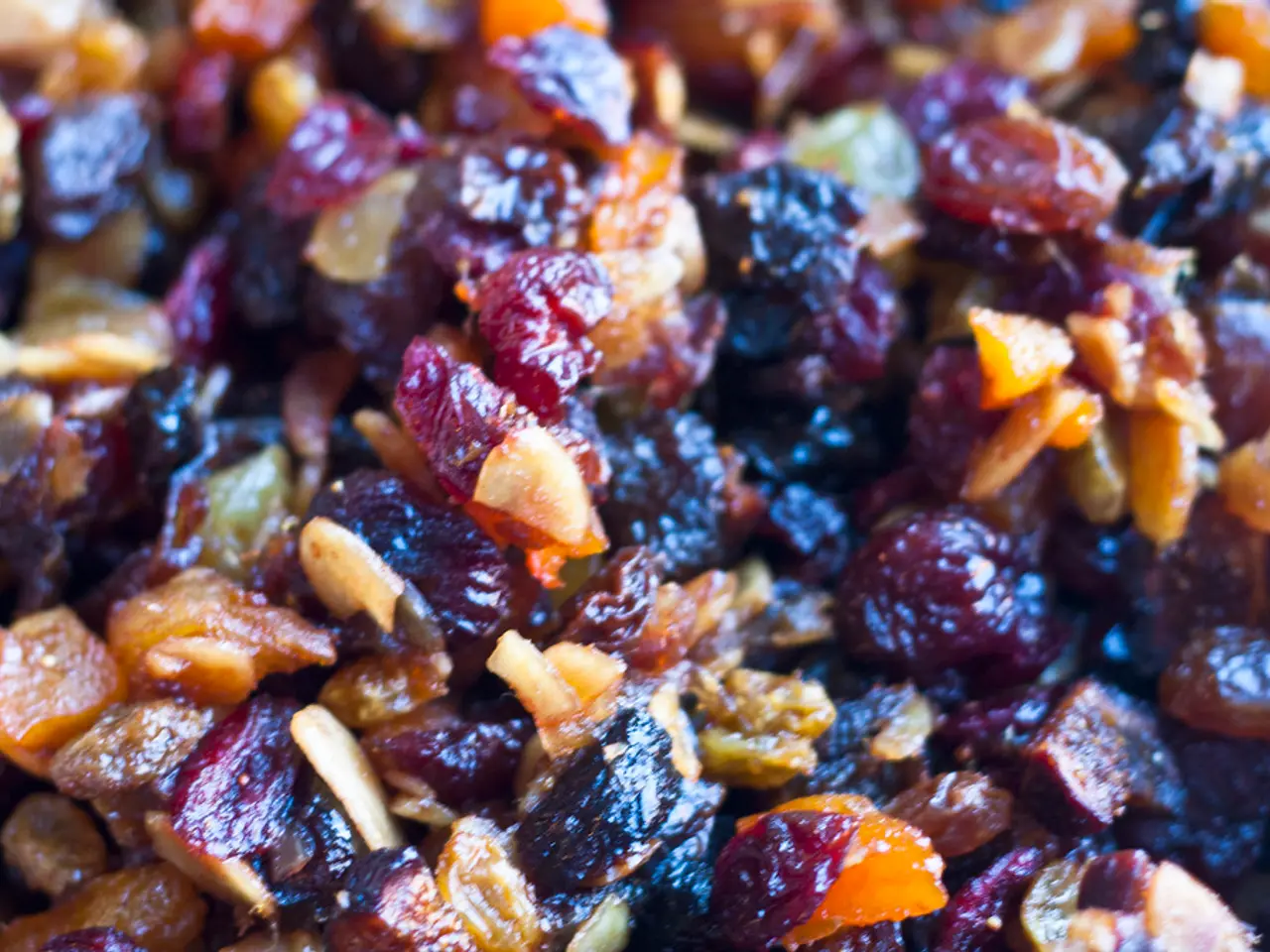Daily Nutritional Guide for Infants Aged 6 to 12 Months
A well-balanced feeding schedule is essential for supporting the optimal growth and development of babies aged 6-12 months. Here's a guide to help parents create a suitable feeding routine for their little ones.
A typical day's feeding schedule consists of a combination of breast milk or formula as the primary nutrition source and 1-3 solid food meals per day. The schedule gradually increases solid foods as the baby grows.
Continue breastfeeding or formula feeding throughout this period, as these remain the main nutrition source until 12 months. Introduce solid foods gradually, starting around 6 months, with small amounts (½ to 2 teaspoons per meal initially), increasing to 2-3 solid meals by around 11-12 months.
Solid foods should include iron-rich options like pureed meats, lentils, egg, and iron-fortified cereal, as well as vitamin C-rich fruits and vegetables to enhance iron absorption. Offer solids at times when the baby is alert, happy, and not too tired, often mid-morning and early evening.
Here's a sample feeding schedule around 6-9 months:
| Time | Feeding | |-------------|--------------------------------------| | 6:00-7:00am | Breast or bottle feed upon waking | | 8:00-9:00am | First solid food meal (small portion)| | 10:30am | Breast or bottle feed | | 1:00pm | Breast or bottle feed + nap | | 3:30pm | Breast or bottle feed | | 5:30-6:00pm | Second solid food meal | | 7:00pm | Breast or bottle feed before bed | | Overnight | Optional breast or bottle feed |
By 11-12 months, babies usually eat 3 solid meals per day plus multiple breast or bottle feeds, with 1-2 naps daily.
Offer water in a cup starting around 6 months alongside solids to encourage hydration. Watch and follow baby’s hunger and fullness cues; feed slowly and patiently to encourage positive mealtime experiences without forcing food. Allow flexibility; some days solids may be skipped as babies gradually learn to eat and explore flavors and textures.
This schedule can be tailored based on whether the baby is breastfed, formula-fed, or mixed fed, and the baby’s growth and hunger signals. Foods to avoid or limit for babies aged 6-12 months include honey, cow's milk as a main drink, choking hazards, added salt and sugar, allergenic foods, and sugary snacks and drinks.
In the afternoon, provide a light and refreshing snack like yogurt or mashed fruits. Suitable foods for this stage include soft and mashed fruits like bananas, avocados, peaches, pears, and apples, cooked and pureed vegetables such as carrots, sweet potatoes, peas, and squash, iron-fortified cereals like rice, oats, and barley, well-cooked and mashed meats such as chicken, beef, or fish, and mashed beans or lentils.
Introducing solid foods to babies aged 6-12 months is important for their growth and development. Establishing a feeding schedule helps them develop a sense of routine, promotes healthy eating habits, ensures they receive adequate nutrition throughout the day, and helps parents create a structured environment for their child's overall well-being.
Before putting your baby to bed, allow for a final breastfeeding or formula feeding session. It's important to note that every baby is unique, and their feeding needs may vary. Recognizing hunger and fullness cues is crucial in creating a successful feeding schedule.
As your baby grows, their nutrition needs will continue to evolve, so adjustments may be necessary. The day should start with a breastfeeding or formula feeding session, followed by introducing solid foods. For dinner, focus on providing a protein-rich puree along with vegetables.
Additional tips include introducing new solid foods early in the day to monitor for allergies, keeping mealtimes positive and stress-free, following your baby's cues while maintaining a flexible routine, encouraging physical activity appropriate for the age to support overall development, and ensuring adequate sleep: 12-16 hours total per day including naps.
- Learning about a suitable feeding routine for kids aged 6-12 months is crucial for parents to support their baby's optimal growth and development.
- A typical daily feeding schedule includes a combination of breast milk or formula, as well as 1-3 solid food meals, with iron-rich and vitamin C-rich options.
- Parents should continue breastfeeding or formula feeding until 12 months, while gradually introducing solid foods, starting around 6 months.
- The feeding schedule should provide enough nutrition, enhance behavior, promote health, and ensure safety during the mealtime.
- By adjusting the feeding schedule based on the baby's growth and hunger signals, parents can create a tailored routine that caters to their family's needs.
- In addition to the recommended foods, it's essential to avoid giving honey, cow's milk, choking hazards, added salt and sugar, allergenic foods, and sugary snacks and drinks to babies aged 6-12 months.
- As the baby turns 12 months, they transition to eating 3 solid meals per day, multiple breast or bottle feeds, and a balanced health-and-wellness diet, facilitating further learning and development.




